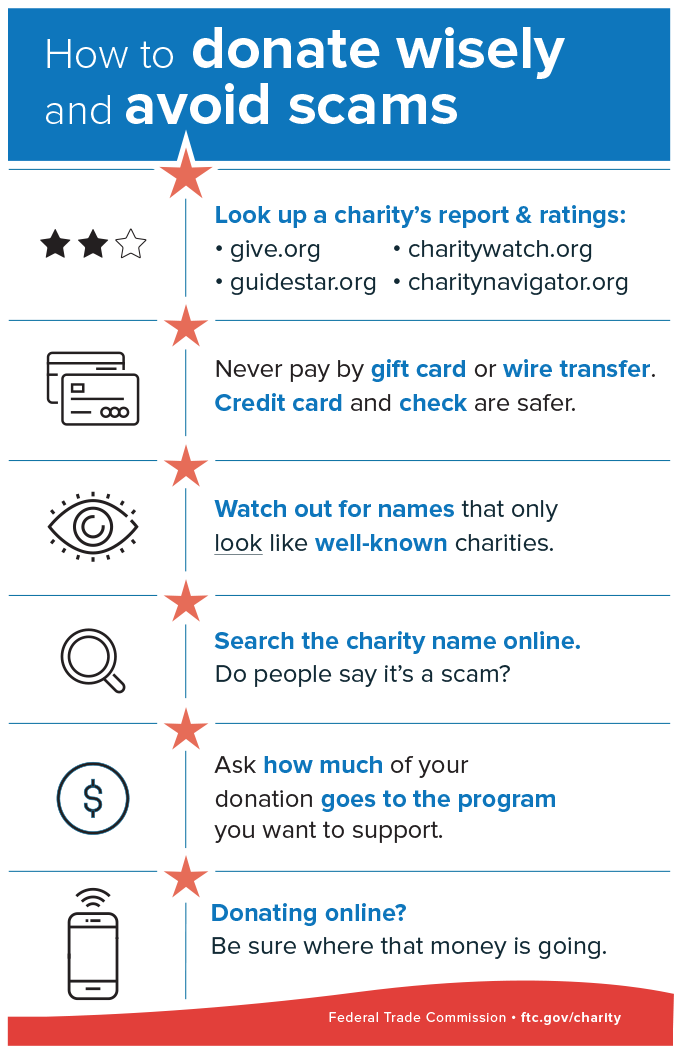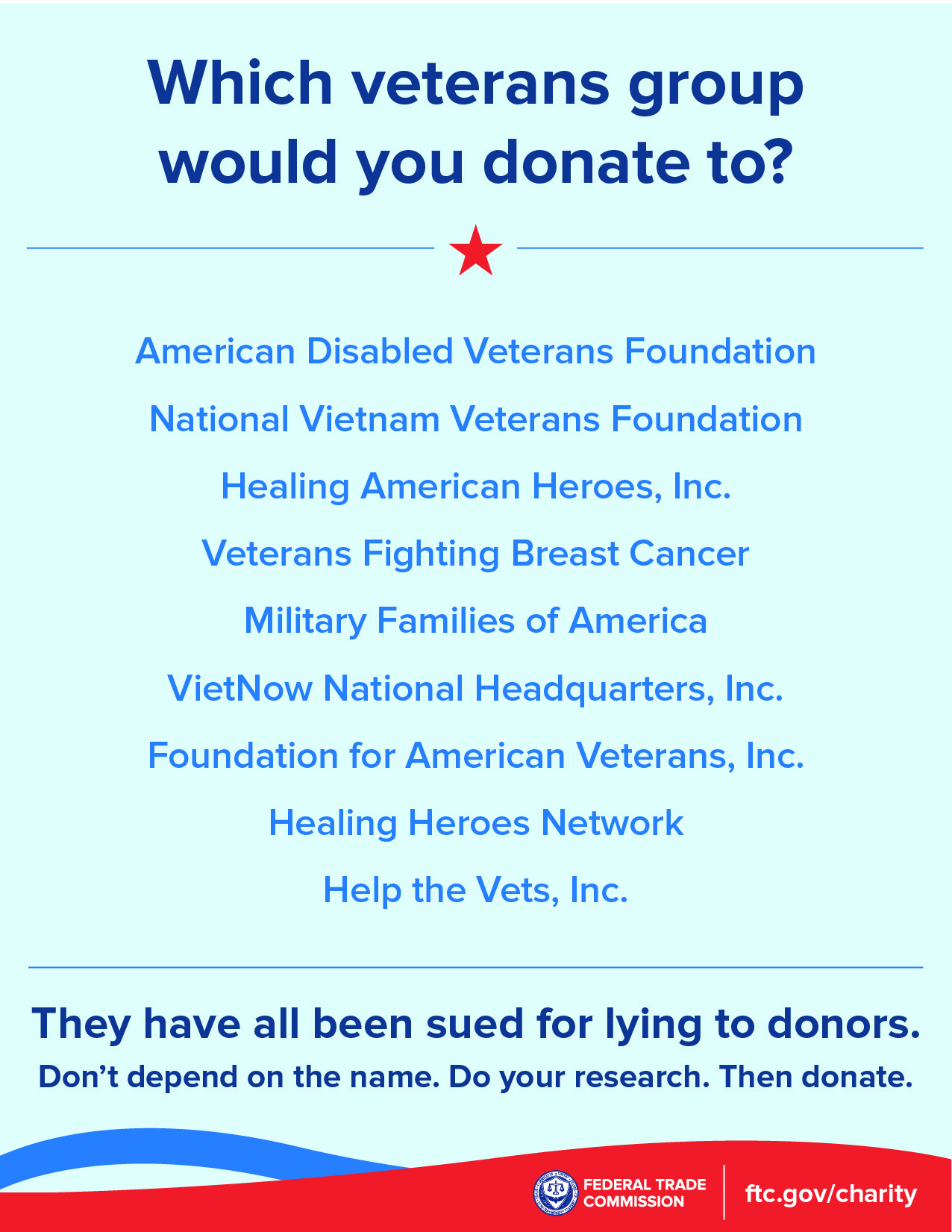In 2015, the FTC and state partners sued and shut down four sham charities that harassed millions of people with more than 1.3 billion illegal robocalls about donating to charity. The FTC and 46 charity state regulators from 38 states and the District of Columbia are holding the fundraisers that made those illegal calls accountable in a lawsuit announced today.
According to the FTC, Associated Community Services (and some related companies and individuals) called more than 67 million people using illegal pre-recorded messages. Those messages falsely claimed the money would go to support breast cancer patients, the families of children with cancer, homeless veterans, and other people in need. In reality, the FTC says that almost none of the more than $110 million donated between 2016 and 2018 went to help those causes.
The next time you get a call with a pre-recorded message from charity fundraisers, remember these tips:

- Don’t trust your caller ID. Dishonest fundraisers can make calls look like they’re from your local area code to get you to answer.
- Hang up if you get a robocall with a pre-recorded message from a charity you don’t know. It’s illegal for a charity to call you with pre-recorded messages, unless you’ve donated to them before. In that case, the caller must tell you that you can opt out of future calls and give you a way to do that.
- Don’t be rushed. A legitimate charity won’t pressure you and will take your donation at any time.
- Ask questions. Ask the fundraiser for the charity’s exact name, web address, and mailing address, so you can confirm it later. And ask exactly how much of your donated dollars will be spent on the charitable cause.
For more tips read Before Giving to Charity. And if you spot a sham charity or a dishonest fundraiser, report them at ReportFraud.ftc.gov.

Search Terms
Topics
March 04, 2021
The best advice is, "Trust No One".
March 04, 2021
Who is suing these organizations and how are they suing them and how much are they getting awarded for each suit?
March 04, 2021
Thank you VERY MUCH FOR THIS INFORMATION. I have gotten calls from scammers who will not give me information. I ask "how much goes toward the vets or police or families get?" And the answer I get is between 10% to 15%, THE REST is "Administration & help cover the cost." I then tell them to take me off their list, because our # is listed on the "Do Not Call List" & will report the # to the FTC if I get another call from them & the calls from the listed # quit.
Scammers are getting better at lying and making fake names just to get $ from you. If the FTC ever has a way to trace this scum, please let me know how.
Keep up the good work.
March 04, 2021
I NEVER answer cold calls. I only answer calls when I recognize callers that were entered into my contacts list. If someone needs to legitimately contact me, they will leave a message.. Over 90% of the time, the fraudsters hang up, without leaving a message, saving me having to deal with their annoying call. My unlisted landline of over 30 years receives up to 6 of these annoying calls a day. Congress MUST create a REAL "Do not call list". The current one does NOTHING to stop the increasing number of these harassing calls. The greeting on my landline and mobile states: "We do not answer cold sales or donation calls. If you have a legitimate reason to call, please state your purpose, and clearly leave your name and phone number and we will be happy to get back to you." Over 90% of the time they just hang up, without leaving a message...
March 04, 2021
Tired of scams........start using a cellphone phone blocker. It works but you might miss some legit calls as well. I would never donate to a so-called charity. The legitimate charities don't call only the crooks call. Telling the crooks 'NO' is not hard for me.
March 04, 2021
It's VERY important to read slowly and carefully. I saw "American Disabled Veterans Foundation" at the top of this list and immediately thought it was DAV (Disabled American Veterans) a legitimate charity that I have supported for years. When I took a second look I saw the difference AND similarity in the two names. Crooks often try to imitate well-known, well-respected organizations with their sham titles or names. Read carefully!
March 05, 2021
Multitudes of warnings and alerts over the years to bring the public's attention to these grifters and many people still fall for the scams. Add that even registered charities often come in with a twist and defraud the public. Do research before handing over a dime to any so-named charitable group.
March 05, 2021
Now they're calling to say my computer is compromised because of the hacking at Microsoft. Normally, if I don't recognize the number, I don't answer the call. However, due to recent surgery I had no choice but to answer all my calls and what a lot of scams there are out there. It's an invasion of privacy and I wish they could be stopped. I appreciate what you are doing in warning us.
March 05, 2021
When donating I always make sure I have the correct address by first looking up the address and making sure the I am using the correct address.
March 05, 2021
I'm on every possible do not call list and still get at least 8 calls a day. Why can't these be stopped?
March 05, 2021
THANK YOU. The calls have finally stopped. I was getting approximately 15 per day here in GA.
March 05, 2021
I got a call recently from some unnamed organization that claimed to be fundraising for families of fallen police officers, and for equipment to keep the others safe. I wasn't in the mood to argue; when his spiel ended, I simply hung up. I have neither time nor patience to tolerate these people any more. Here's another hint as to how to tell if it's a scammer: Always answer number you're unsure about with a quickly snapped "hello." Then don't make another sound. If no one speaks for several long seconds hang up immediately. That's an automatic dialer used by telemarketers, collectors, and scammers. It's a machine that's programmed to dial groups of consecutive phone numbers based on the criteria selected by the scammers. Once you pick up, it takes a few seconds for the auto dialer to connect the call. You might sometimes hear the busy voices of numerous people in the background when it connects but just before the telemarketer/scammer starts talking. Hang up when you don't hear anyone within the first 5-8 seconds.
